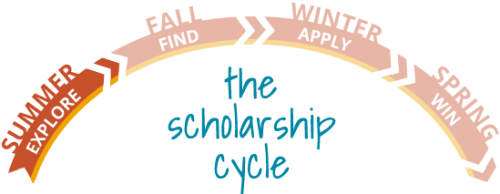Explore your strengths

During the summer: work on setting clear academic and career goals.
There are three things you need to know about yourself before you can complete a winning scholarship application:
- What is your career goal and your plan to reach it?
- What experiences in life have motivated you to reach your goal?
- How do you give back to your community?
We have created a Self-evaluation template to help you answer these three questions.
file lines Self-evaluation template
How to use the template: save a copy of the template by clicking the link, then choosing File > download as a Word doc.
1. Career goal
Before you start your application, you need to have a clear idea of the direction you are headed. Your career goal should be specific and attainable.
How to figure it out
- Use the How to Choose a Career track to match your skills and interests with careers and job titles. If you need help, visit a career center.
- Learn which degree will qualify you for your future career, and which schools offer this degree. An academic advisor can help you define how your education at PCC will lead to your overall education goal.
- Complete your self-evaluation:
- Write your future job title in your self-evaluation worksheet.
- Brainstorm a list of reasons you will enjoy this job.
- You’ll know you’re done when you can clearly state your future job title and each step in your academic plan.
Don’t know your career goal?
question If you’re undecided about a career, you’re not alone – many people spend their whole lives figuring out the perfect career! But for the purpose of your application, you need to decide on a goal you might be interested in pursuing. This will show direction and ambition to the scholarship committee.
2. Life experiences
When donors read your scholarship essays, they are trying to see if you have the grit and determination to achieve your goals. So right now, start thinking about the experiences and factors in your life that have given you knowledge, experience, and education.
How to figure it out
- Complete your self-evaluation:
- Answer the questions in part 2 of the self-evaluation template.
- Look back over your answers and find some stories, experiences, strengths, and skills that demonstrate how you have learned lessons or overcome challenges.
- You’ll know you’re done when you can think of a couple of stories that explain why you are determined to reach your goals.
3. Giving back to the community
Scholarship committees want to give money to students who will eventually go on to improve our communities. Therefore, you need to demonstrate to them that you have a broader goal outside of your own school and career path; that you are thinking about the bigger picture. You show this by describing ways that you have contributed to your community in the past.
How to figure it out
- Complete your self-evaluation:
- Answer the questions in part 3 of the self-evaluation template.
- Look back over your answers and find stories and examples that show your involvement in your community, family, and school.
- You’ll know you’re done when you have a couple of stories that demonstrate how you contribute to improving the world around you.
Have you answered each of the three big questions? Great! You’re ready to start looking for scholarships!

